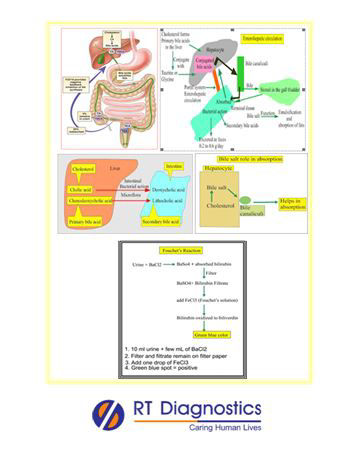Bile Acids:
Why Bile Acids test?
CLINICAL INFORMATION :
Bilirubin is a bile pigment formed during the breakdown of RBCs (hemoglobin). Bilirubin is in two forms in the body. It can be classified as indirect (free or un-conjugated) and direct (conjugated with glucuronic acid in the liver) bilirubin.
Bile acids are formed in the liver from cholesterol, conjugated primarily to glycine and taurine, stored and concentrated in the gall bladder, and secreted into the intestine after digestion of a meal (especially high-fat diet). Bile acid is produced from cholesterol by the liver and is stored in the gall bladder. Bile is required for fat digestion by the body. They function to emulsify fat (micelles formation) in the intestine and promote fat digestion and facilitate nutrient absorption and they are highly conserved via entero-hepatic circulation. Bile Acids test measures the levels of bile acids indicates the hepatic function of the liver and also reflects on the portal venous circulation i.e biliary system, intestine, portal circulation, and hepatocytes. High levels of bile acid/cholestasis which is caused by diseases of the liver or by the liver disorder – of hepatic origin (intrahepatic cholestasis) is seen in cholestatic liver disease or liver damage (liver sclerosis, liver cancer, alcoholic liver disease, viral hepatitis, pregnancy (i.e obstructive cholestasis etc) and due to metabolic hepatic disorder/ Metabolic liver disease e.g Gilbert disease, Crigler-Najjar syndrome and Dubin-Johnson syndrome. Extra-hepatic cholestasis occurs by disorders outside the liver due to obstructive cause e.g primary biliary cholangitis may be caused due to bacterial sepsis, portal vein thrombosis, Budd-Chiari syndrome, Wilson disease, hemochromatosis, sickle cell disease, Hodgkin’s lymphoma, auto-immune diseases, inflammatory bowel diseases, cyctic fibrosis, certain medications such as the combination of drugs with amoxicillin along clavulanate, antifungal drugs, anti-inflammatory drugs, anti-thyroid, birth control pills, immune-suppressive drugs, parenteral nutrition, gall stones, biliary atresia, pancreatitis, etc. In certain conditions like bile acid malabsorption (BAM), the bile acids are not processed within the digestive system of the body resulting in symptoms of chronic diarrhea also known as Bile Acid Diarrhea (BAD). Classical symptoms of cholestasis are jaundice – yellow discoloration of the skin, eyes, nails (deposition), pruritus (itchiness), and excretion of dark urine due to excess bilirubin excreted by the kidneys. While light-colored or clay-colored stools are seen in biliary obstructive jaundice with right-sided pain in the abdomen. While in prolonged cases the complication include kernicterus (neurological complication due to deposition in the brain). Incidences of cholestasis are seen during medication, pregnancies, and also in newborn children. While in infections such as malaria where excessive RBC lysis occurs the symptoms are recurrent fever, chills, and rigors. Other tests include liver function test, Van-den Bergh test (direct and indirect methods) for conjugated and unconjugated bilirubin, kit methods, colorimetric and spectroscopy studies.

General instructions:
Sample Requirement: Specimen –As directed by the physician or the Pathologist (As required). Test Preparation: None.
NOTE - Sample for specimen collections may vary based on the patient’s condition / cases according to the patient’s presenting complaints/signs or symptoms:
SPECIMENREQUIREMENT (Special or Rare Cases) - As instructed and guided by Physician / Clinician / Pathologist / as per Laboratory’s requirements, according to procedures and protocols.
This Multi-Specialty Clinical Referral Laboratory RTDIAGNOSTICS provides precise and accurate tests with an extensive range of testing services to the medical centers to help in the diagnosis and identification of pathology in the test specimens for infectious diseases and also to evaluate the function of organ systems of the patient. It prevents further complications and helps to stabilize and restore health to near normalcy at the earliest without delay.



